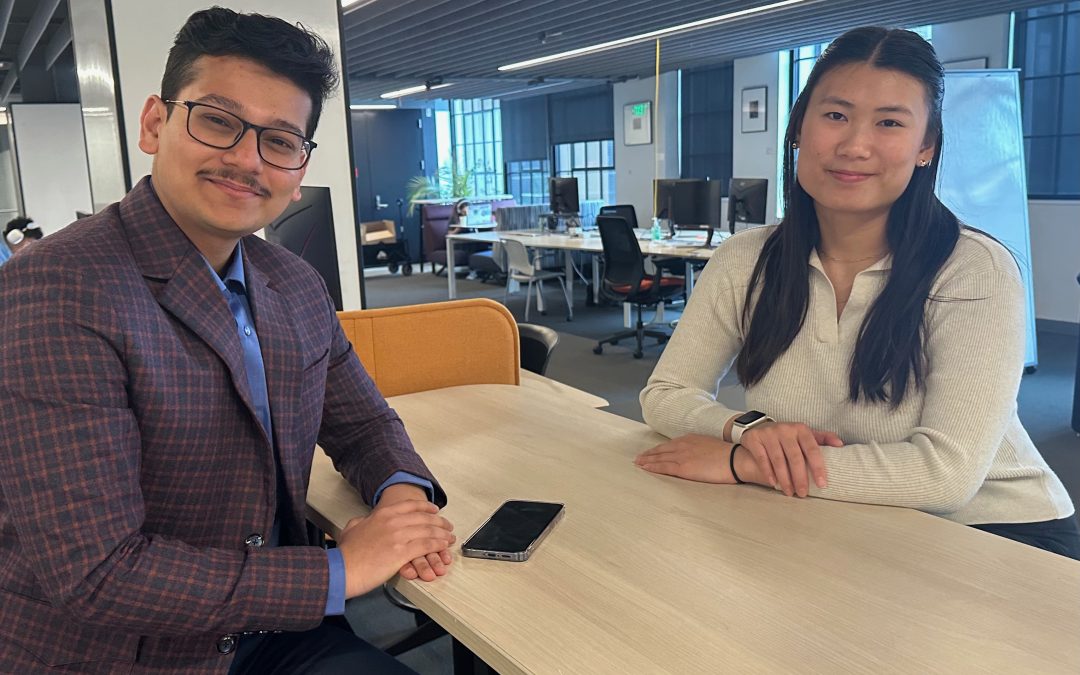Sayandeep Biswas and Alexis Huynh Seek to Commercialize MIT Tech to Replace Diesel with Hydrogen in Tomorrow’s Trucks.
By Jennifer Bonniwell | Proto Ventures News
February 28, 2025
If you had to select an industry that was stuck in the past and least likely to adopt innovation, long-haul trucking might be at the top of the list. Low profit margins. Lots of individual decisionmakers. And fuel that meets the needs of the trucking industry nearly perfectly—except for the terrible pollution.
And that’s where Proto Ventures found its next project.
“Decarbonizing long-haul trucking has long been established as a tough sector to innovate. It remains an open problem, partly I think, because transportation emissions associated with consumer goods often don’t get the attention they deserve.” said chemical engineering PhD candidate Sayandeep Biswas. “And if you’re looking to do impactful science, well, tough problems are a great place to start.”
Biswas is working with Proto Ventures to commercialize MIT research that would allow clean-burning hydrogen to replace diesel fuel in long-haul trucking. A recent MIT research study assessed the fuel needs of long-haul trucking operations and suggested that hydrogen could be a viable replacement for diesel, if they could find a cost-efficient method of distribution and storage.
Biswas and MIT undergraduate Alexis Huynh joined MIT’s venture studio Proto Ventures as fellows in January. Both are working on the hydrogen project.
“Sayandeep and Alexis are perfect candidates for the Proto Ventures Fellowship: they bring a unique MIT idea to the table, and they are looking to partner with someone who understands both science and entrepreneurship to build a real company in the coming year. This is exactly what MIT Proto Ventures is about,” said Venture Builder David Cohen-Tanugi, who was hired in May 2023 to lead the Clean Energy & Fusion Channel for Proto Ventures.
The Science
Focusing on hydrogen power came out of a study run by William H. Green, the Hoyt Hottel Professor in Chemical Engineering and director of the MIT Energy Initiative. Biswas joined the study in 2021, which sought to define the fuel needs of long-haul trucking operations and test low-cost cleaner power alternatives.
Finding a replacement for diesel is difficult because the fuel meets the needs of the trucking industry so well. Diesel has high energy content per pound – leaving more weight for payload – and ships as a liquid so it’s easy to find at thousands of roadside gas stations. But burning diesel releases high levels of CO2 and other carbon emissions.
Green’s study found that hydrogen could be a cleaner replacement for diesel, but only if they could develop efficient transportation and distribution. They looked at liquid organic hydrogen carriers (known as LOHCs) which can release hydrogen gas through an endothermic process. However, when hydrogen is released at a gas station then compressed for use, nearly 60 percent of the power is lost due to endothermic dehydrogenation and compression.
To get around this energy loss, Green’s team is creating an on-board dehydrogenation system that eliminates the need for hydrogen compression and allows for direct release into a truck’s hydrogen combustion engine.
LOHCs benefit from having similar physical properties to diesel and therefore require very minimal infrastructure changes to adopt. In addition, they are not flammable (unlike diesel) and are available in commercial quantities at relatively cheap prices.
The next steps are to build a prototype engine fueled by hydrogen generated from LOHCs and use that engine for a truck’s powertrain system.
“This will be the first-of-its-kind powertrain system using hydrogen power,” Biswas said.
Partnering With MIT’s Venture Studio
Biswas applied to the Proto Ventures Fellowship in December 2024. He wanted to investigate commercialization, but he really needed a partner to take the next step.
“I’ve taken classes, and I get the venture-building concept,” said Biswas, who also said the MIT community has been incredibly supportive. “But we really needed someone to roll up their sleeves with us and participate in the decision-making about business plan, market, and tactical next steps to turn our idea into a real business. This is where MIT Proto Ventures comes in.”
Cohen-Tanugi also sees this as the perfect pairing of Proto Ventures’ strengths with MIT researchers.
“So many times we see promising research end up on the lab room floor,” Cohen-Tanugi said. “Startups are hard. Hard tech startups are harder. It’s not that the ideas are not good enough, it’s that this is incredibly complex industry and monumentally challenging problem.”

Sayandeep Biswas, PhD candidate and Proto Ventures fellow
Meet Sayandeep Biswas
Biswas has a roundabout route to the Boston area. He was born in India, spent high school in South Africa, then went to college at the University of Minnesota. He came to MIT for his PhD beginning in 2021.
“MIT brings together people from a multitude of fields, across academia and industry, and that gives you a lot of different ways to explore entrepreneurship within MIT,” Biswas said. “MIT gives you a lot of opportunities, so if you choose entrepreneurship it’s because this is where your passion and interest lies.”
Biswas acknowledges that working on Green’s long-haul trucking research could have remained an academic pursuit – publish and move on. But Biswas credits Green with helping him see the commercial potential.
“Bill [Green]’s still in academia, but he looks at a problem from a perspective that is solution oriented and not just a theoretical aspect,” Biswas said.

Alexis Huynh, MIT ’25, Proto Ventures fellow
Meet Alexis Huynh
Since entering MIT, Huynh has been interested in sustainability. In her freshmen year, she joined MIT Motorsports, a student project team that builds electric racecars from scratch. She eventually became the mechanical lead and led the team to compete in the 2023 Formula SAE and 2023 Formula Hybrid Competition.
“It was the most challenging and rewarding experience I had at MIT,” said Huynh, who also was one of the racecar drivers at the competition at the Michigan International Speedway.
Huynh has interned at two car companies—Rivian and Polaris—but found herself more interested in entrepreneurship and the startup ecosystem at MIT.
As a mechanical engineering major, Huynh knew that she wanted to do a hardware-based startup and felt that she could make the most impact developing sustainable technology. Through an undergraduate research project, she was connected to Biswas.
“I initially reached out because I was looking for a fun, MechE project, but I soon saw the potential for this to truly revolutionize the trucking industry,” she said. “I just knew that this was something worth pursuing.”
As Huynh looks toward graduation in June, she is planning to continue working on the long-haul trucking project.
About MIT Proto Ventures
Proto Ventures is the first-ever venture studio of this kind within a university. Proto Ventures launched in October 2019 under the MIT Innovation Initiative (now the MIT Office of Innovation) with the goal of accelerating the creation of ventures from MIT research.
Like a private-sector venture studio, Proto Ventures curates ideas from within MIT’s ecosystem of labs and shepherds them to market. A key distinction with traditional university entrepreneurship programs is that Proto Ventures staff play a proactive role in coming up with ideas, forming teams, and shaping the direction of projects.
“We start with problems first – seeking out the world’s hardest problems, then building ventures to solve them,” Cohen-Tanugi said.
The hydrogen project is within Proto Ventures’ Fusion & Clean Energy channel, which launched in 2022 in partnership with MIT’s Plasma Science Fusion Center (PSFC). This channel focuses on creating groundbreaking new opportunities in clean energy by leveraging MIT’s top-tier talent and core competencies, including superconducting magnets, artificial intelligence, robotics, plasma science, high-power radio frequency systems, cryogenics, advanced materials, electromagnetic sensors, and high energy physics.
